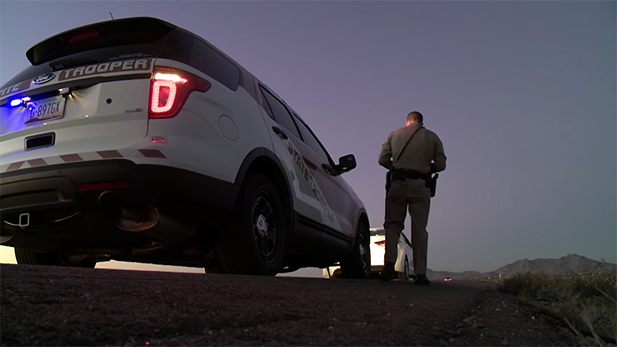 The Border Strike Force is a specialized unit of the Arizona Department of Public Safety that targets drug and human smuggling.
The Border Strike Force is a specialized unit of the Arizona Department of Public Safety that targets drug and human smuggling. Editor's note: This report is a product of Arizona Sonora News, which offers readers and media outlets stories from students in the University of Arizona's School of Journalism.
By David McGlothlin, Arizona Sonora News
Department of Public Safety reports released through the Arizona public records law fail to back up Gov. Doug Ducey’s claims that his Border Strike Force had the impact detailed in his State of the State address.
Ducey said the strike force made “more than 300 arrests and seized 4,400 pound of marijuana, 194 pounds of meth and 21 pounds of heroin” from operations since September until his speech in January.
He offered this data to support his legislative request for $31 million to expand DPS’s border operations.
Arizona Sonora News Service filed requests with DPS seeking records of the strike force’s operations. The public records were released two months later and exposed inconsistencies in the governor’s numbers.
The data — more than 800 pages — revealed 51 drug-related arrests and seizure of 1,685 pounds of marijuana from operations dating back to September through February. No large seizures of either heroin or meth showed up in the reports.
Most of the records detailed routine traffic stops for following too closely, auto theft investigations and arrest warrants, which do not fit the described scope of the Border Strike Force.
Only one report mentioned, “working in conjunction with federal, county and municipal law enforcement agencies” in a Border Strike Force operation called Sidewinder II, which produced four arrests and seizure of 705 pounds of marijuana.
According to a Feb. 10 press release by DPS, the four-day operation from Feb. 4-7 resulted in 40 arrests and seizure of 3,743 pounds of marijuana. Those numbers were not supported in the public records obtained from DPS.
Only two reports from DPS took place within those four days. In total, these documents accounted for less than 900 pounds of marijuana seized.
The governor’s office received updates with statistics from the strike force’s operations through DPS leading up to Ducey’s speech, which is how the arrest and seizure totals were comprised, said Daniel Scarpinato, spokesman for Ducey.
Based on the documents provided by DPS from the records request, the reported success of the strike force cannot be verified.
Capt. Damon Cecil, DPS public information officer, explained not every report or case was provided if it involved ongoing investigations. For that reason, he said, “the numbers won’t add up 100 percent.”
Daniel Barr, attorney for the Arizona First Amendment Coalition, said holding back information because of an ongoing investigation is an insufficient reason for not releasing the documents.
He pointed to the 1993 Supreme Court Case — Cox Publications v. Collins — which “said there is no ongoing active police investigation exemption to public records law.”
The governor’s office and DPS stand by the accuracy of the numbers and reasoning behind not releasing all case reports and documents related to open investigations, said Scarpinato. After Arizona Sonora News asked DPS about the number discrepancy, the office emailed a spreadsheet that detailed other confiscations, but the document is not an official police report.
The gap between the DPS reports and Ducey’s Border Strike Force statistics raises concerns about transparency and accountability if the Legislature approves the governor’s plan.
That proposal is being criticized by border sheriffs whose operating budgets were repeatedly cut by the state in recent years and who want the funds for their already established border patrol work.
As of Jan. 22, DPS director Colonel Frank Milstead reported the strike force completed three operations, with three more scheduled in the future.
At that time, Arizona Sonora News Service asked for public records from the operations and he pledged a response by the following week, but the documents were not available until March 15.
The reports contained 18 pages of documents from July, which is before the strike force was started. It also included 18 blank pages and 121 vehicle theft cases dating back to September.
David McGlothlin is the Bolles Fellow from the University of Arizona covering the legislature for Arizona Sonora News. Reach him at dmcglothlin@email.arizona.edu.

By submitting your comments, you hereby give AZPM the right to post your comments and potentially use them in any other form of media operated by this institution.